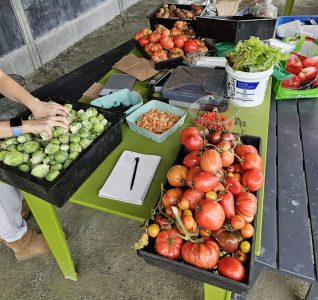
Fall harvest being weighed and sorted by our volunteers! (credit: Zahra Chan-Khan)
Like many students at UBC, I experience stress related to the rising cost of living and have fortunately found some relief through UBC’s food security programs such as Sprouts, Agora Café, UBC Farm, Food Hub Market, and the AMS Food Bank. Working with the Healthy Harvest program this semester has helped me connect with where my food comes from, in addition to quantifying the impact of a single community program.
In 2018, the Healthy Harvest program was established with a goal in mind: providing fresh, organic produce to increase food access for the UBC community. Fast forward to the 2023 growing season where we have harvested over 2,000 kg of produce (4,300 lbs.) for the AMS Food Bank and other food groups on campus with the incredible support of our Friends of the Garden and volunteers. By localizing the food supply chain, growing without pesticides, and promoting in-season produce, the Healthy Harvest Program plays a crucial role as a sustainable, water-wise food system right here on campus and demonstrates the key contribution botanic gardens around the world can make.
Water-smart food systems are important every day, but they hold particular significance today, October 16th 2023, as we observe World Food Day. This is an annual initiative established by the United Nations’ Food and Agriculture Organization (FAO) to raise awareness and inspire action regarding global nutrition. This year, the United Nations has chosen the central theme: ‘Water is Life, Water is Food. Leave No One Behind’, which underscores the intricate connection between food, water, and climate change.
So, how do these elements intertwine?
Agriculture is currently responsible for over 70% of the world’s water usage. As climate change amplifies extreme weather events like droughts and monsoons, many of our freshwater sources are drying up or being contaminated. Over 2 billion people currently live in water-stressed countries, and an estimated two-thirds of the world will experience temporary or long-term scarcity by 2025. Water shortages are directly tied to food insecurity, disease, poverty, and inadequate education, which disproportionately affect developing countries and already marginalized groups. The water crisis, along with the rise in food insecurity since the COVID-19 pandemic, are clear signs that our food systems need work.
At UBC Botanical Garden, we place food security and agricultural education, conservation and engagement programs at the core of our mission. Since 1983, the Food Garden has served as a hub for food literacy education. Aligned with the UN’s declaration that 2023 is the year of millets – a group of small cereal grains that are low input, drought-resistant, and nutrient-dense – we have embraced millets and are growing multiple varieties sourced from the Canadian Gene Bank. Our Food Garden horticulturalist, Linda Layne, explains that millets are an ideal staple alternative to wheat, especially in places facing increasingly dry soils. The millets are currently growing successfully in the Food Garden, and Linda plans to send seeds back to Gene Bank, a form of ex-situ conservation.
UBC Botanical Garden and other botanic gardens around the world are doing their part to support sustainable food systems – but this work is community driven and needs your support to continue. If you’re wondering how you can make a difference, consider these ideas: garden at home and in your community, reduce your food waste, buy local and seasonal produce, reduce your red meat consumption, and support community-oriented food initiatives. Have a happy World Food Day!

UBC Forestry student and Garden WorkLearn, Zahra (credit: Zahra Chan-Khan)
About the Author
Zahra Chan-Khan is a fourth year Forestry major at UBC. She is one of three WorkLearn students on the Sustainability and Community Partners team at UBC Botanical Garden. This semester, she has been managing volunteers and the delivery of our Healthy Harvests.
